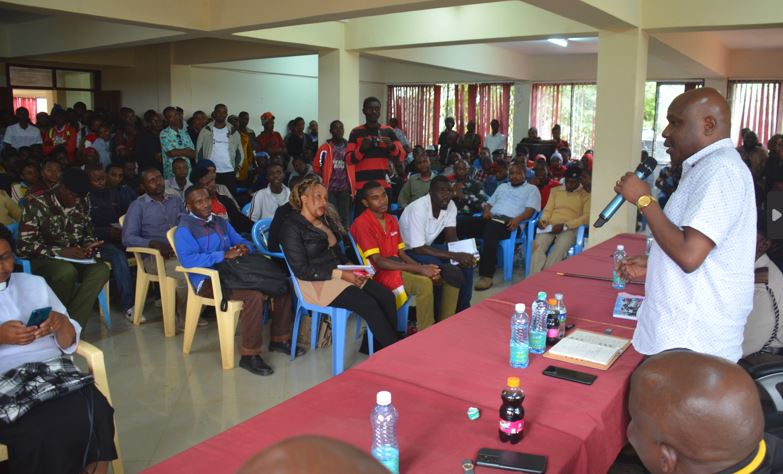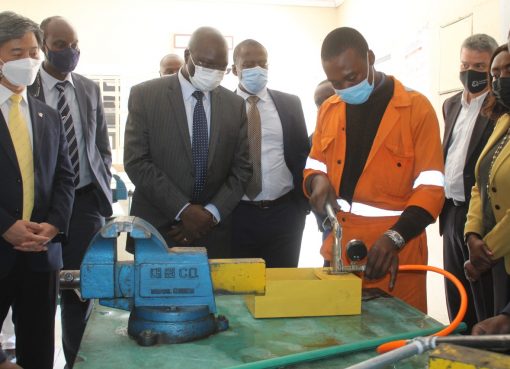To a casual eye, the endless blue expanse of the ocean makes a breathtaking view. The choppy waters and the waves rocking the horizons offer a perfect portrait for marketing holiday destinations and decorating the faces of colourful Christmas postcards.
However, beneath the beauty is a vast trove of life-changing opportunities whose potential, if exploited, is likely to be the key to addressing the unemployment crisis facing the youth in the country.
The Principal Secretary, State Department for Shipping and Maritime Affairs, Mr. Shadrack Mwadime, terms the ocean and the associated blue economy value chain as the new frontier for job creation for thousands of youths.
“We have not even scratched the surface of the potential offered by the ocean. The entire blue economy value chain is a massive area for the creation of employment opportunities for local youths,” he says.
The blue economy value chain entails ocean-based job opportunities in cruise and cargo ships sailing the high seas. Such include seafarers, maintenance units, navigation teams, and hospitality. There are also land-based jobs in ports, docks, and landing bays for ground crew, workers in Container Freight Stations (CFS) and landing zones for fishing trawlers. There are also establishment of ponds for fish farming inland, among other opportunities.
Kenya, according to the PS, has lagged behind in tapping the potential of the ocean despite the fact that 80 percent of international trade occurs across the oceans. One sector where Kenya is performing dismally in the maritime sector is on the seafaring front.
Global statistics indicate there are approximately 1.6 million registered seafarers. Africa has 76,000 seafarers. Kenya has only a paltry 6,000 seafarers working for shipping lines. This number is negligible compared to countries like the Philippines, which has over 200,000 seafarers and a marine workforce that injects over Sh950 billion annually into their country as forex from salaries and other allowances paid to the seafarers.
“We are talking about very attractive returns when we talk of the blue economy,” said the PS in Mwatate on Tuesday during a meeting with hundreds of youths from the region in a multi-sectoral symposium to discuss the opportunities offered by the blue economy sector.
The meeting brought together stakeholders in the maritime sectors, including senior officials from the Kenya Maritime Authority, Bandari Maritime Academy, the Higher Education Loans Board (HELB), and seafarers and crewing agencies.
The PS, who is on a two-day visit in Taita-Taveta County, has scheduled a meeting with youths from all four sub-counties of Mwatate, Taveta, Voi, and Wundanyi.
He states that the maritime sector is expected to add 5,000 direct jobs annually to the Kenyan economy, even as the government pushes for partnership agreements with major shipping lines across the world to absorb the skilled youth in the sector.
Already, Kenya National Shipping Line (KNSL) has an agreement with Mediterranean Shipping Company (MSC) to offer jobs to Kenyan youth. MSC is the biggest shipping line in the world. The agreement entails providing 1,500 permanent workers and offering 1,500 more workers crucial sea time to gain experience. From January to date, 320 people have been employed under this arrangement.
Sales and Operations Manager at KNSL, Mr. Jacob Safari, said youth eyeing shipping jobs needed to have the requisite skills, including the compulsory Standards of Training, Certification, and Watchkeeping (STCW), a requirement for all seafarers.
Mr. Alex Mwakazi, a youth from Rong’e Juu village, however, noted that one major obstacle in the maritime sector was the prohibitive cost of courses needed to equip them with skills. He pointed out that most courses would cost hundreds of thousands of shillings, with STCW alone costing Sh35,000 for a 10-day course.
This, he said, was out of reach for the majority of the youth who were struggling to make ends meet.
“The government should step in and make the courses affordable. It’s not easy to raise the money required,” he said.
The PS disclosed that his department had set aside Sh20 million as an educational support fund to be administered by HELB. These loans will only be issued to students undertaking maritime-related courses. In the next financial year, the government will increase this fund to Sh25 million to encourage more youth to take maritime courses.
“You have no excuse not to take those courses. We have allocated money to strictly cater for students taking maritime courses,” he said.
As part of creating more job opportunities, the government is holding talks with other major shipping lines to open spaces for qualified youth in both cruise and cargo ships. They include MSC, Maersk, and Cosco.
One major step the government has taken to bolster jobs in the maritime sector is to revamp the Kenya National Shipping Line. The PS says that it is regrettable that KNSL, the national marine carrier, did not have a single marine vessel.
He stated that KNSL would become a profitable entity by regulating crewing agencies and taking over the clearance of government goods destined for Kenya. This model would entail ships offloading both civilian and security agency goods at the docks and having KNSL take over the responsibility of shipping the goods to their destination. The PS said the government had ring-fenced Sh500 million for that exercise.
“We will earn from cabotage. Once the goods are landed, KNSL will take over the role of taking them to their destination. This is why we need to have our vessels, but if need be, we can charter vessels to work for us,” explained the PS.
As part of the expansion of opportunities in the marine sector, the government is also exploring the modalities of introducing cruise ship tours along the coastline. This will promote local entertainment groups and boost the marketing of cultural and traditional art to tourists.
Another major area that Kenya is eyeing is having a stake in the multi-billion fishing industry. The government is pushing for international fishing companies that harvest fish in Kenyan waters to dock at the Liwatoni Fisheries Complex for value addition.
By Wagema Mwangi





